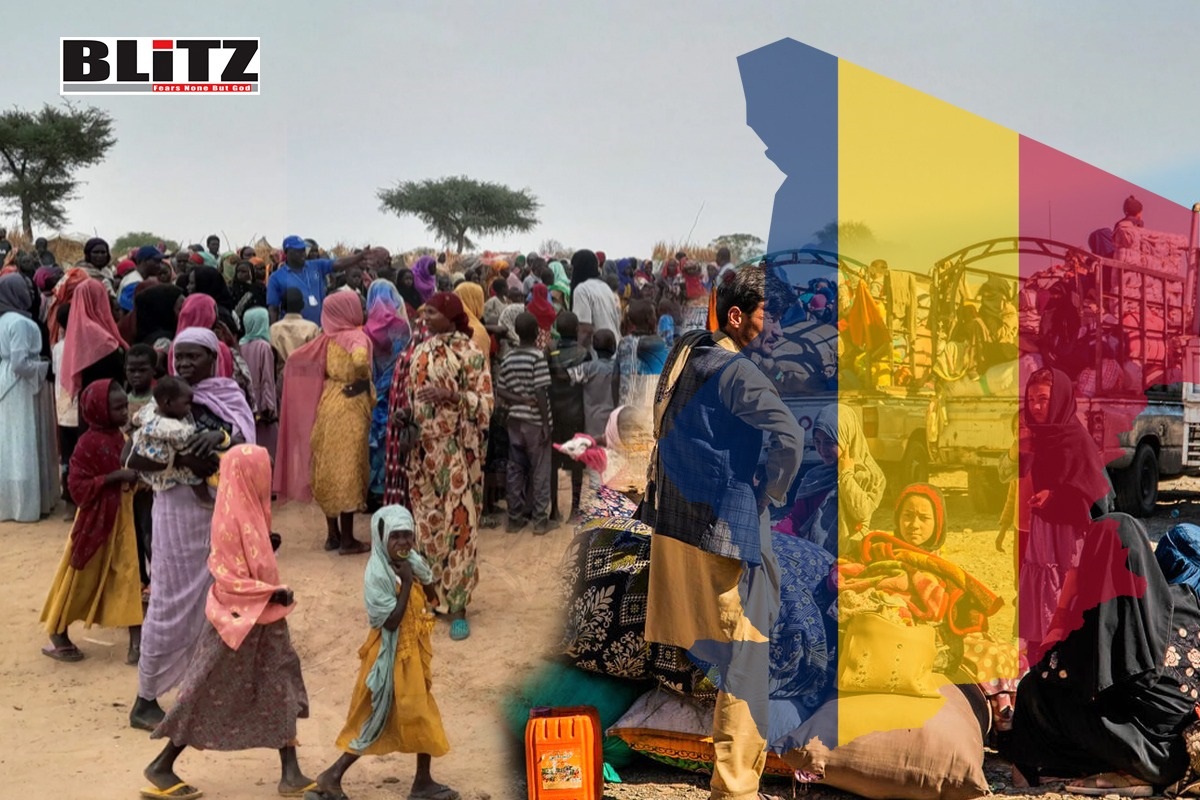Chad faces a humanitarian crisis with a growing refugee influx
- Update Time : Wednesday, March 13, 2024

Amidst the ongoing civil strife in Sudan, Chad finds itself confronting a critical juncture, grappling with the looming threat of an escalating refugee crisis. The UN Refugee Agency has issued a stark warning, highlighting the imminent risk of a surge in refugee influx from Darfur into Chad. This troubling forecast is compounded by a severe lack of basic necessities, further exacerbating the suffering of vulnerable populations already reeling from the impacts of conflict in Sudan.
As Sudan’s conflict approaches its one-year mark, its repercussions extend far beyond its borders, casting a profound shadow over neighboring Chad. Already burdened with its own socioeconomic challenges, Chad now faces the daunting task of accommodating an influx of refugees fleeing the horrors of war. In the face of this adversity, the urgent need for increased humanitarian aid and substantial development investment in Chad emerges as a pressing concern, crucial for stabilizing the country’s fragile socioeconomic fabric and upholding its noble tradition of offering sanctuary to those in need.
Despite the formidable challenges ahead, Chad remains steadfast in its commitment to providing refuge to those escaping persecution and conflict, embodying the principles of international humanitarian law. In navigating the complex landscape of refugee management and humanitarian response, Chad demonstrates resilience and solidarity, embodying the spirit of compassion and empathy.
The influx of refugees, predominantly comprising women and children, underscores the urgent need for comprehensive support mechanisms to address their vulnerabilities. A significant majority of arrivals in Chad are women, many of whom have endured harrowing experiences of gender-based violence, including rape. The imperative for comprehensive support, including medical and psychological assistance, cannot be overstated.
While the UN Refugee Agency endeavors to provide essential services, the scale of the challenge far exceeds the available resources, leaving a significant gap in the provision of adequate support for the forcibly displaced. Additionally, Chad faces the monumental task of accommodating nearly half a million internally displaced persons and returnees, further highlighting the magnitude of the humanitarian crisis within its borders.
By mid-February, the number of new refugees seeking sanctuary from the conflict in Sudan surpassed the half-million mark, solidifying Chad’s position as the primary destination for those fleeing the turmoil that erupted a year ago. This influx catapults Chad to the forefront as Africa’s leading host of refugees per capita, with 1.1 million refugees in a population of almost 19 million. Among this multitude are individuals displaced by preceding conflicts from nations including the Central African Republic, Nigeria, and Cameroon.
During a visit to Chad this month, Kelly T. Clements, the UN Refugee Agency’s deputy high commissioner, underscored the gravity of the situation. Engaging with local officials to assess the prevailing conditions and strategize on the necessary response, Clements expressed concerns regarding the anticipated influx of Sudanese families in the coming weeks.
Clements noted that Chad’s unwavering commitment to maintaining open borders, despite the region’s fragility, underscores its humanitarian ethos. However, such generosity exacts a toll on Chad, with the country bearing the weight of hosting refugees not only from the protracted Sudanese conflict but also from preceding humanitarian crises.
An expected surge in refugee arrivals, particularly from Darfur, poses a significant challenge and is likely to further strain Chad’s already stretched resources and infrastructure. The burden of accommodating and providing for an increasing number of displaced individuals against the backdrop of socioeconomic fragility once again underscores the urgency of concerted international action.
This necessitates the international community’s rallying behind Chad by offering tangible support and solidarity to alleviate the burgeoning humanitarian crisis and foster sustainable solutions. Beyond immediate humanitarian assistance, Chad urgently requires substantial development investment to strengthen its capacity to absorb and integrate refugee populations seamlessly. Investing in critical sectors such as infrastructure, healthcare, education, and livelihood opportunities holds the key to unlocking the potential for sustainable development and resilience-building within refugee-hosting communities.
The challenges facing Chad extend beyond humanitarian aid to encompass broader geopolitical dynamics and regional security considerations. Influxes of refugees from conflict-ridden regions inevitably pose security risks, highlighting the imperative for robust international cooperation in negotiating a ceasefire in Sudan and bringing an end to the devastating war.
As the international community grapples with an array of crises and challenges, the plight of refugees in Chad serves as a poignant reminder of our collective responsibility to protect the most vulnerable among us. The principles of solidarity, compassion, and shared humanity must guide our actions as we strive to build a more inclusive and equitable world.
The escalating refugee crisis in Chad demands urgent attention and action from the international community. Enhancing humanitarian aid, bolstering development investment, and fostering regional cooperation are essential to alleviate the suffering of displaced populations and pave the way for sustainable solutions. As we stand at a pivotal juncture in history, let us reaffirm our commitment to upholding the rights and dignity of refugees and displaced persons, ensuring that no one is left behind in our collective pursuit of a better future.













Leave a Reply